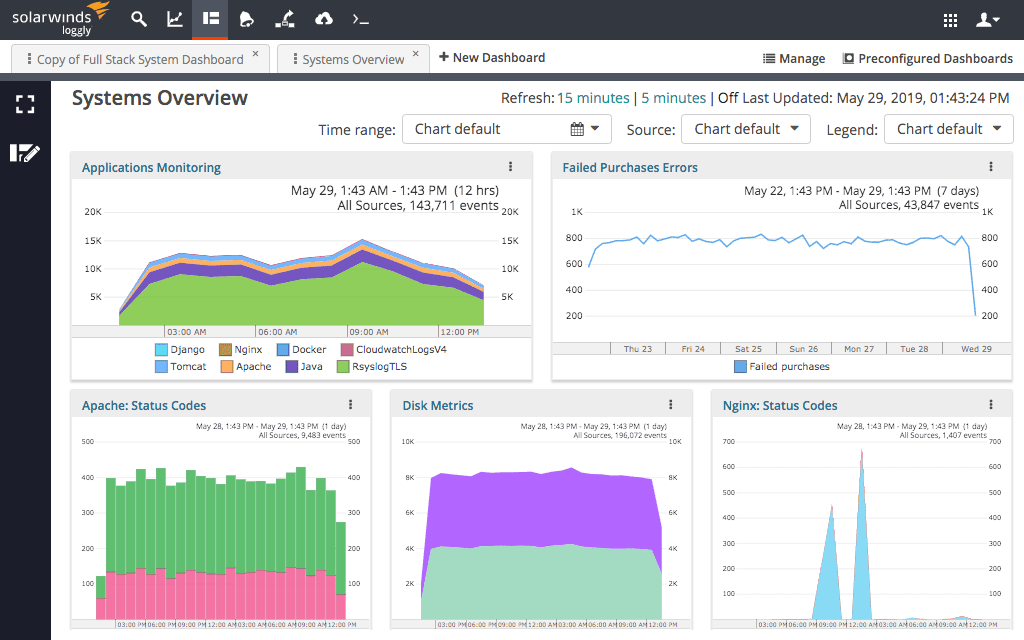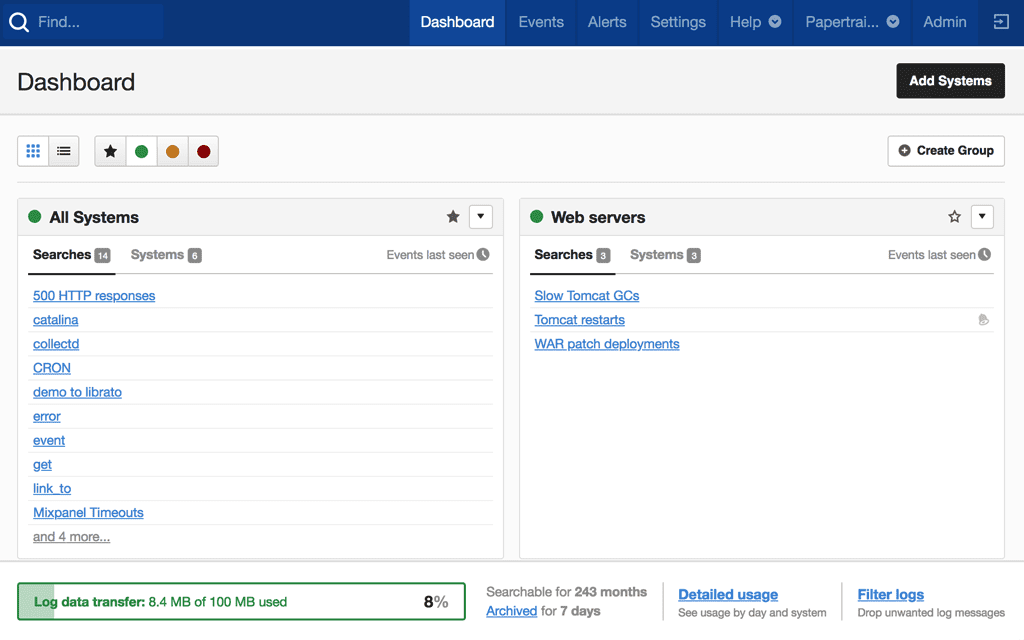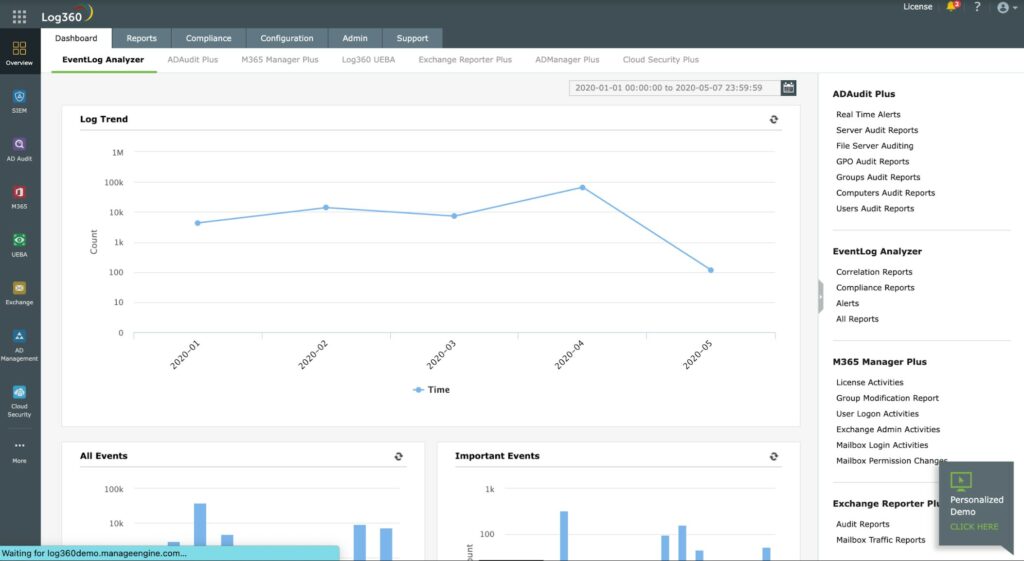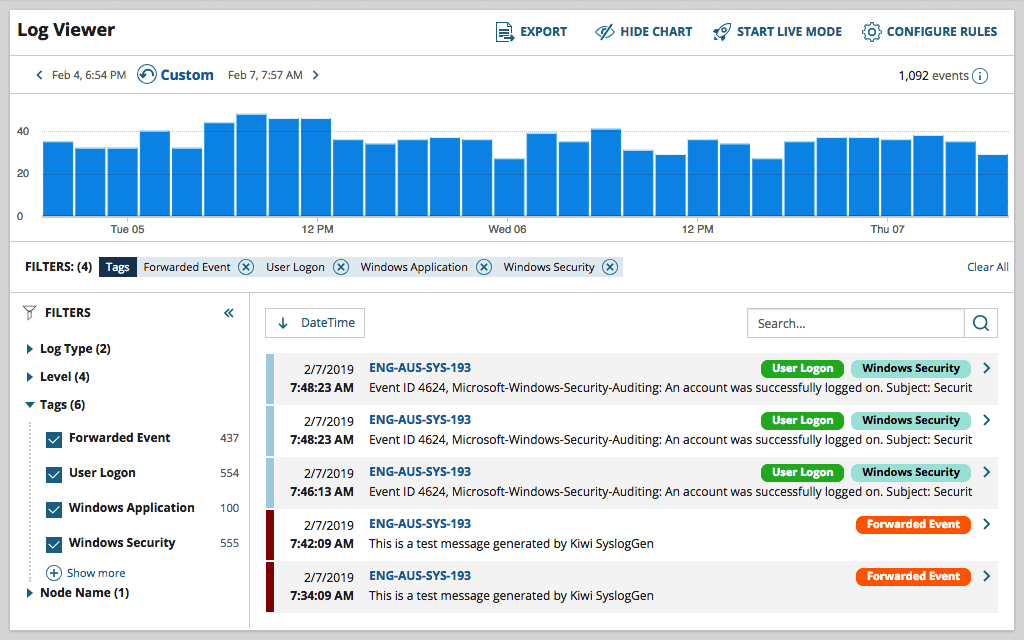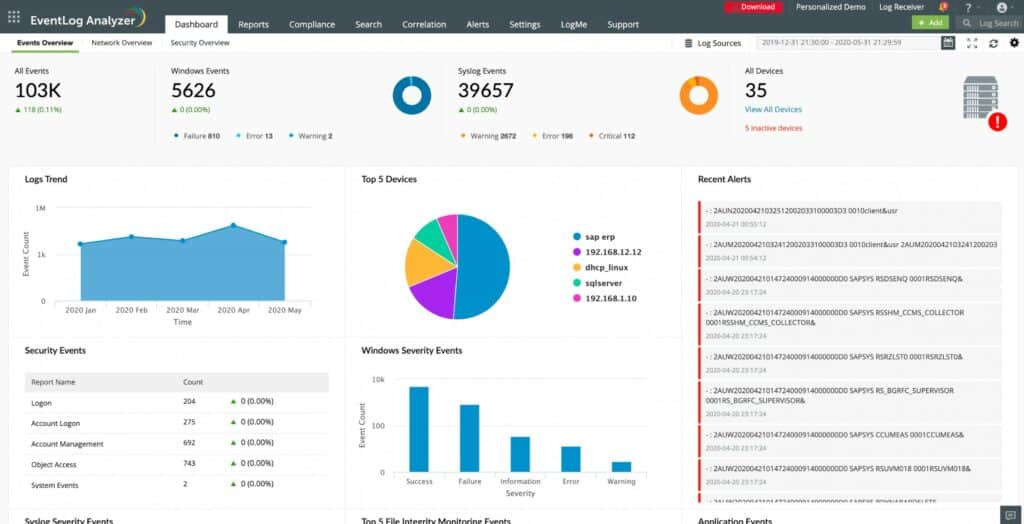Every business generates thousands to millions of transactions per day, depending on the size of the business, nature of operations, number of applications, and more. Every aspect of every transaction is logged so that you can imagine the huge tons of logs generated each day.
Here is our list of the best log parsing tools:
- Loggly – FREE TRIAL This SaaS tool aggregates your logs and helps you make sense of the log entries. Its fast and powerful search capabilities are an added advantage.
- Papertrail – FREE TRIAL This cloud logging service and management tool helps to quickly identify and troubleshoot issues related to your application or infrastructure.
- ManageEngine Log360 – FREE TRIAL This SIEM system gathers log messages and presents a data viewer with analytical tools. Runs on Windows Server.
- SolarWinds Log Analyzer – FREE TRIAL This tool provides advanced log management and analysis with real-time visibility into the performance and availability of applications and infrastructure.
- ManageEngine EventLog Analyzer – FREE TRIAL This log management tool offers in-depth visibility into your logs for managing SIEM operations.
- Datadog This tool collects, monitors, manages, and analyzes large logs to provide in-depth insights into application performance, availability, and reliability.
- Sematext Logs This is a log management-as-a-service that analyzes your data and provides advanced visualizations.
- Graylog A centralized log management solution for capturing and analyzing data from your logs in real-time.
Now you may wonder why in the world a business should store every aspect of its operations.
Well, logs come in handy in many situations. First off, it eases the process of troubleshooting as your engineers can simply see through the logs to understand what has happened and why a particular operation failed. Similarly, logs are helpful for post-investigation to understand how some operations happened and how their performance and reliability can be improved.
It also helps identify cyberattacks, their source, and the existing infrastructure's vulnerabilities so that they can be fixed at the earliest.
Given these overarching benefits, logs are undoubtedly an essential part of every organization's activities.
However, since these log files generate tons of information, it is hard to find what you want. In addition, some log files may not even be in a human-readable format. Hence, to make the most of the benefits of logging, you need tools that will parse these files quickly to help you find relevant information quickly.
The Best Log Parsing Tools
Log parsing tools are a must-have for every organization as they help make sense of all the information contained in log files.
Our methodology for selecting log parsing tools and software
We reviewed various log parsing tools and analyzed the options based on the following criteria:
- Support for various environments and applications
- Integration support for SIEMs and other platforms
- Robust search functionality
- Graphical interpretation of data, such as charts and graphs
- A free trial period, a demo, or a money-back guarantee for no-risk assessment
- A good price that reflects value for money when compared to the functions offered
Let's now run through the features and pricing of each of these tools to make an informed decision.
1. Loggly – FREE TRIAL
SolarWinds Loggly is a SaaS log parsing tool that aggregates thousands of log files and enables you to quickly find what you want.
Key Features:
- Offers proactive monitoring into app performance, system behavior, and other unusual activity.
- Monitors essential resources and metrics.
- Helps to identify and eliminate issues and vulnerabilities before they impact the end customers.
- Traces issues to their root cause.
- Displays the interaction between components to help understand dependencies.
- Integrates well with leading tools such as Stack, GitHub, Jira, and more.
- Analyzes and visualizes data to get answers to key questions.
- Tracks SLA compliance and meets the regulatory requirements of most industry standards.
- Makes it easy to spot trends, so you can mitigate or leverage them as required.
- Supports KPI reporting.
- Comes with built-in dashboards and charts to get a bird's eye view of the state of applications.
- Simple to set up as it is cloud-based.
- Scales well to meet your growing business needs.
- Uses open standards, so there's no dependence on proprietary standards.
- Works well on clouds, containers, IoT devices, private and public clouds, data centers, hybrid environments, microservices, and more.
Why do we recommend Loggly?
Loggly is recommended for its robust SaaS log parsing capabilities, which efficiently aggregate thousands of log files, making it easier to monitor app performance, system behavior, and other activities. Its features, like proactive monitoring, resource tracking, and root cause analysis, are particularly beneficial for swiftly identifying and addressing issues and vulnerabilities.
Who is it recommended for?
Loggly is ideal for system administrators, DevOps teams, and IT professionals who require a cloud-based log management solution. Its scalability and support for various platforms and environments, including clouds, containers, IoT devices, and hybrid setups, make it well-suited for businesses of all sizes, particularly those with complex digital infrastructures.
Pros:
- Lives in the cloud, allowing syslogs servers to scale regardless of onsite infrastructure
- Setup is easy, no lengthy onboarding process
- Can pull logs from cloud platforms such as AWS, Docker, etc
- Data is immediately available for review and analysis
- Offers a completely free version with limited retention
Cons:
- Would like to see a longer 30-day trial
Pricing:
Loggly offers four pricing plans, and they are as follows.
- Lite. Free. It comes with centralized log management and automated log summaries, making it a good choice for anyone looking to try log parsing.
- Standard. $79/month. This plan is a good choice for small businesses as it supports unlimited users, built-in email alerting, charts and dashboards, and access to SolarWinds' advanced support team.
- Pro. $159/month. Ideal for growing companies with unlimited users, API access, peak coverage protection, archive to Amazon S3, and more.
- Enterprise. $279/month. Comes with advanced features such as GitHub and Jira integration, anomaly detection, federated identity management, and more.
EDITOR'S CHOICE
SolarWinds Loggly emerges as our top log parsing tool, offering a cloud-based, comprehensive solution for monitoring app performance and system behavior. Its ability to aggregate and analyze thousands of log files sets it apart, enabling swift identification and resolution of issues.
Loggly's proactive monitoring features help in identifying vulnerabilities before they impact end-users, and its efficient root cause analysis aids in swiftly pinpointing problem areas. The simple setup, immediate data availability for analysis, and a free version option add to its appeal, making SolarWinds Loggly an outstanding choice for businesses seeking a robust log parsing solution.
Download: SolarWinds Loggly
OS: Cloud-based
Download: Click here for a fully functional 30-day free trial.
2. Papertrail – FREE TRIAL
SolarWinds Papertrail is a cloud-hosted log management tool that supports quick troubleshooting of applications and infrastructure.
Key Features:
- Provides complete visibility across your entire infrastructure.
- Quickly diagnoses and fixes customer problems.
- It is quick to set up and takes only a few minutes.
- Supports full-stack monitoring for cloud and native applications and infrastructure.
- Provides instant visibility into logs and, through it, the state of your applications and infrastructure.
- Searches through stored and streaming log files to help find the information you need.
- You can use the search query syntax to troubleshoot issues.
- Comes with advanced search capabilities to find the required information within seconds.
- Sends instant alerts via Slack, Librato, PagerDuty, or custom webhooks.
- Integrates with Hadoop and Redshift for advanced analytics.
- Visualizes log throughput to identify patterns and anomalies quickly.
- Scales well to meet your business growth.
- Supports TLS-based encryption and certificate-based destination host verification for extra security.
- You can apply filters to your logs as needed.
- Enables you to create multiple alerts by copying details from your existing alerts.
- Enhances readability with color codes.
- Supports command-line prompts.
Why do we recommend Papertrail?
Papertrail is recommended for its quick and efficient cloud-hosted log management capabilities. It supports full-stack monitoring for both cloud-native and traditional applications and infrastructure. Features like instant visibility into logs, advanced search capabilities, and integration with analytics tools like Hadoop and Redshift make it a powerful tool for diagnosing and resolving customer issues swiftly.
Who is it recommended for?
Papertrail is well-suited for IT teams and developers who need a log management solution that is quick to set up and easy to use. Its capabilities are particularly beneficial for those managing complex systems where rapid troubleshooting and monitoring are required.
Pros:
- The cloud-hosted service help scale log collection without investing in new infrastructure
- Encrypts data both in transit and at rest
- Backup and archiving is automatically done, and part of the service
- Uses both signature-based and anomaly detection for the most thorough monitoring possible
- Includes a free version
Cons:
- Time must be invested to fully explore all features and options
Pricing: It starts at $7 per month. But, of course, the exact cost depends on how much data is generated and how long you want to be searchable in real-time.
Download: Click here to sign up for the free plan.
3. ManageEngine Log360 – FREE TRIAL
ManageEngine Log360 is a software package for Windows Server that offers log management plus a SIEM tool. The system dashboard includes a data viewer that includes a set of data analysis tools, such as search, sort, filter, and group.
Key Features:
- Log collection for Windows Events and Syslog messages from operating systems
- The ability to interface with more than 700 software packages to extract logs
- A log consolidator that translates different log formats into a common layout
- A facility to perform manual analysis on log data
- A log manager that files log messages in rotated files under a meaningful directory structure
- Compliance auditing and reporting for GDPR, GLBA, PCI DSS, FISMA, HIPAA, and SOX
- Anomaly-based threat detection
- User and entity behavior analytics to create a baseline of normal activity
- Alerts that can be manually adjusted
- Notifications can be forwarded through service desk team management tools, such as ManageEngine ServiceDesk Plus, Jira, and Kayoko
- File integrity monitoring
- Security policy creation templates
- Collects logs from sites, cloud platforms, and virtual structures
Why do we recommend ManageEngine Log360?
ManageEngine Log360 stands out for its comprehensive approach to log management and SIEM. It supports log collection from a wide range of sources, offers thorough compliance auditing, and provides anomaly-based threat detection. Its user and entity behavior analytics, along with file integrity monitoring and policy creation templates, make it a versatile tool for in-depth security analysis and management.
Who is it recommended for?
Log360 is recommended for organizations seeking a robust log management and SIEM solution, especially those needing to meet various compliance standards. Its capabilities cater well to IT security teams in medium to large enterprises.
Pros:
- Great dashboard visualizations, ideal for NOCs and MSPs
- Can integrate multiple threat data steams into the platform
- Offers robust searching of logs for live and historical event analysis
- Provides monitoring cross-platform for Windows, Linux, and Unix systems
- Can monitor configuration changes, preventing privilege escalation
Cons:
- ManageEngine offers a suite of advanced services and features can time to explore and test out
Pricing: Free edition limited to monitoring 25 workstations. Professional edition – register for custom pricing.
Download: Begin by registering for a 30-day free trial of the Professional edition.
4. SolarWinds Log Analyzer – FREE TRIAL
SolarWinds Log Analyzer is an advanced log management tool that quickly investigates machine data to identify the root cause of issues.
Key Features:
- Provides quick insight into system behavior.
- It intuitively aggregates logs and tags and filters them as needed.
- Sends alerts for effective troubleshooting.
- Integrates well with the Orion platform to provide a unified view of IT infrastructure.
- Collects, consolidates and analyzes thousands of syslogs, traps, Windows, and VMware events to provide detailed insights into their performance.
- Supports elaborate troubleshooting and root-cause analysis.
- Searches through logs to find matching keywords.
- Executes searches using many search criteria and applies filters to help find just the information you want.
- You can save, schedule, and even export these search results.
- Displays logs in a visually appealing dashboard or live data stream.
- You can add color codes to find what you want quickly.
- Collects Windows flat log files to help admins troubleshoot and resolve issues.
- Forwards logs to other applications such as SIEMs and ticketing systems.
Why do we recommend SolarWinds Log Analyzer?
SolarWinds Log Analyzer is recommended for its advanced log management features, which aid in quick system behavior analysis and troubleshooting. Its integration with the Orion platform, ability to handle thousands of syslogs and events, and elaborate troubleshooting features make it a powerful tool for comprehensive log analysis and management.
Who is it recommended for?
SolarWinds Log Analyzer is particularly suitable for enterprises looking for a SIEM solution with a wide range of integrations and a simple log filtering process. It is ideal for IT professionals and network administrators who require detailed insights into system performance and security.
Pros:
- Enterprise-focused SIEM with a wide range of integrations
- Simple log filtering, no need to learn a custom query language
- Dozens of templates allow administrators to start using SEM with little setup or customization
- Historical analysis tool helps find anomalous behavior and outliers on the network
Cons:
- SEM Is an advanced SIEM product built for professionals, requires time to fully learn the platform
Pricing: The cost starts at $857. Click here for a custom quote.
Download: Click here for a fully functional 30-day free trial.
5. ManageEngine EventLog Analyzer – FREE TRIAL
ManageEngine EventLog Analyzer is a comprehensive log management tool that analyzes logs and provides insights into potential threats, so you can address them before they affect the broader operations.
Key Features:
- Collects and analyzes logs from more than 700 sources.
- Parses data from any sources and converts them to a human-readable form.
- Correlates log data to detect security vulnerabilities.
- Makes it easy to create new rules for custom parsing.
- Audits logs from perimeter devices such as routers, switches, firewalls, and more.
- Detects critical changes, identify and data thefts, and cyberattacks.
- Tracks downtime in business-critical applications, databases, web servers, and more.
- Comes with a built-in global IP threat database to detect malicious IP addresses, domains, and URLs.
- Provides drag and drop custom rule builder to identify and mitigate attacks.
- Exports extensive compliance reports.
- Supports agent-based and agentless collections.
- Raises a ticket automatically for every rule alert.
- Displays all your log data in a single console.
- Automatically updates the threat intelligence system to stay on top of threats.
- Resolves incidents quickly with its advanced insights.
- Supports compliance with industry standards and also generates reports based on compliance templates.
- Detects malicious inbound and outbound traffic.
- Monitors the DML and DDL activities of SQL databases.
- Works well across a wide range of devices and operating systems.
Why do we recommend ManageEngine EventLog Analyzer?
ManageEngine EventLog Analyzer is recommended for its ability to analyze logs from over 700 sources, offering insights into potential threats. Its correlation of log data, custom parsing rules, and compliance auditing features make it a comprehensive tool for understanding and mitigating security vulnerabilities and ensuring compliance.
Who is it recommended for?
EventLog Analyzer is ideal for IT security teams and administrators who need a versatile log management tool capable of parsing data from various sources and ensuring compliance with industry standards. It is particularly beneficial for organizations that require extensive forensic log audit capabilities.
Pros:
- Customizable dashboards that work great for network operation centers
- Multiple alert channels ensure teams are notified across SMS, email, or app integration
- Uses anomaly detection to assist technicians in their day-to-day operations
- Supports files integrity monitoring that can act as an early warning system for ransomware, data theft, and permission access issues
- Forensic log audit features enable admins to create reports for legal cases or investigations
Cons:
- Takes time to fully explore the entire ManageEngine ecosystem
Pricing: Register for a customized quote.
Download: Begin by registering for a 30-day free trial.
6. Datadog Log Management
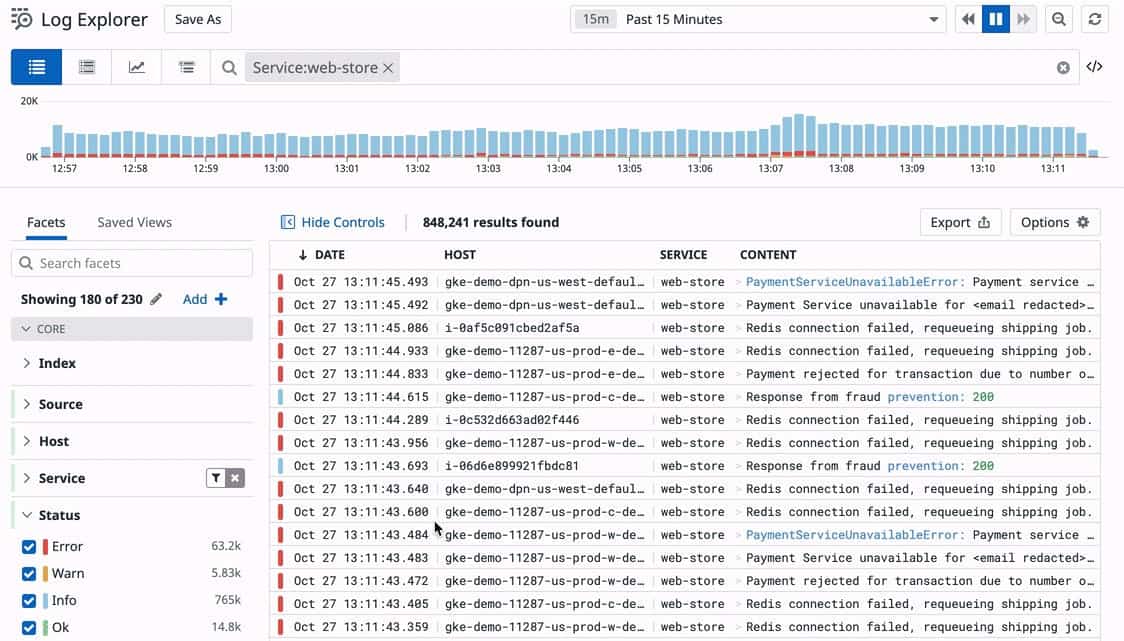
Datadog Log Management is an advanced tool for collecting and analyzing logs to provide the insights you need for improved decision-making. It also provides insights into the performance and availability of your applications.
Key Features:
- Decouples log ingestion from indexing, so you can choose to send the same logs for both log management and archiving.
- Supports any number of logs.
- Collects, processes, archives, explores and monitors all your logs.
- Automatically indexes your logs to identify security threats.
- Enriches all your logs with pipelines and processors.
- Generates the required metrics from the ingested logs.
- Manages your logs with storage optimized archives
- Correlates your logs and traces to provide advanced insights.
- Searches through your logs to gather the information you want.
- Performs extensive analytics with your indexed logs.
- Clusters your indexed logs to identify patterns.
- You can see the ingested logs across all your environments in real-time.
Why do we recommend Datadog Log Management?
Datadog Log Management is recommended for its advanced log collection and analysis features. It offers the flexibility of decoupling log ingestion from indexing, supporting extensive analytics and pattern identification. Its real-time monitoring and scalability make it an excellent choice for businesses requiring comprehensive log management and SIEM solutions.
Who is it recommended for?
Datadog Log Management is well-suited for businesses of all sizes, particularly those looking to scale their monitoring efforts. Its flexible pricing and extensive feature set cater to organizations requiring both internal and external network monitoring.
Pros:
- Supports live log collection as well as long-term archival options for SIEM solutions
- Can monitor both internally and externally giving network admins a holistic view of network performance and accessibility
- Allows businesses to scale their monitoring efforts reliably through flexible pricing options
Cons:
- Would like to see a longer trial period for testing
Pricing: Datadog's log management has two pricing plans, namely,
- Ingest. It starts at $0.10 per ingested or scanned GB per month. This plan is ideal when you want to consume, process, live tail, and archive all logs
- Retain or rehydrate. $1.70 per million log events per month. Go for this plan when you want to retain records based on their value and rehydrate from archives on-demand
Download: Click here for a free trial of Ingest and here for the Retain or Rehydrate plan.
7. Sematext Logs
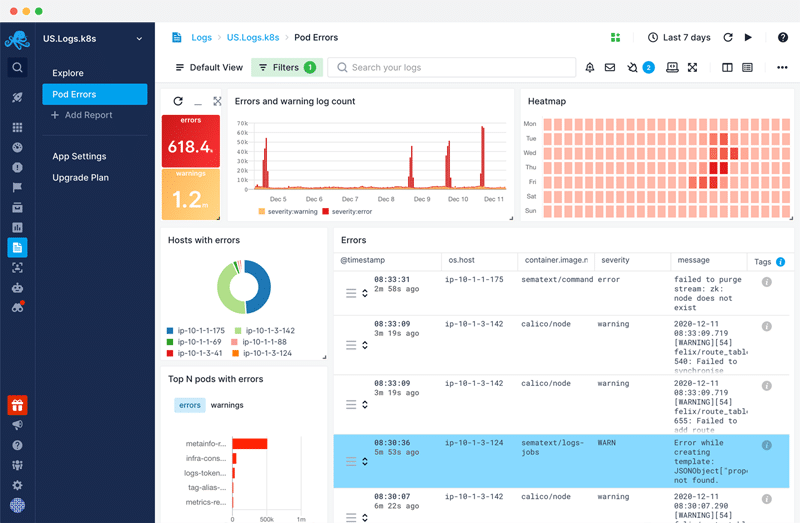
Sematext Logs is a log management-as-a-service platform that collects logs from different parts of your software stack and infrastructure to provide a centralized view.
Key Features:
- Works well across the software stack, IoT infrastructure, hardware devices, and more.
- Indexes all the logs in a centralized location.
- Supports the sending of logs from containers, AWS, applications, custom events, and more.
- Uses an Elasticsearch API for searching and indexing.
- Indexes data from any location, format, and source.
- Creates custom dashboards using real-time data to help you understand the trends and latest events.
- Summarizes top values for easy reference.
- Supports a simple query-like syntax similar to Google, thereby making it easy to search through the logs.
- You have the option to convert all searches into real-time alerts.
- Sends alerts via email, Slack, PagerDuty, and more.
- Integrates well with popular third-party applications.
- Triggers alert based on pre-configured thresholds.
Why do we recommend Sematext Logs?
Sematext Logs is recommended for its comprehensive log management-as-a-service platform, which effectively collects and indexes logs from various software stacks and infrastructures. Its Elasticsearch-based search and indexing, along with customizable dashboards and alert systems, make it a versatile tool for centralized log management.
Who is it recommended for?
Sematext Logs is ideal for IT teams and network administrators who need a flexible and comprehensive log management solution. It is particularly beneficial for those requiring a service that supports data beyond event logs, such as SNMP reports.
Pros:
- Uses Elasticsearch for flexible query options
- Supports data outside of just event logs such as SNMP reports
- Supports threshold-based alerts, ideal for maintaining SLAs
- Has a freeware version for testing
Cons:
- No on-premise version
- Relies on Kibana for data visualization
Pricing: Sematext logs start at $50 per month. You can bundle it with Sematext's Monitoring, Experience, and Synthetics offerings as well at an extra cost.
Download: Click here to start a free trial.
8. Graylog
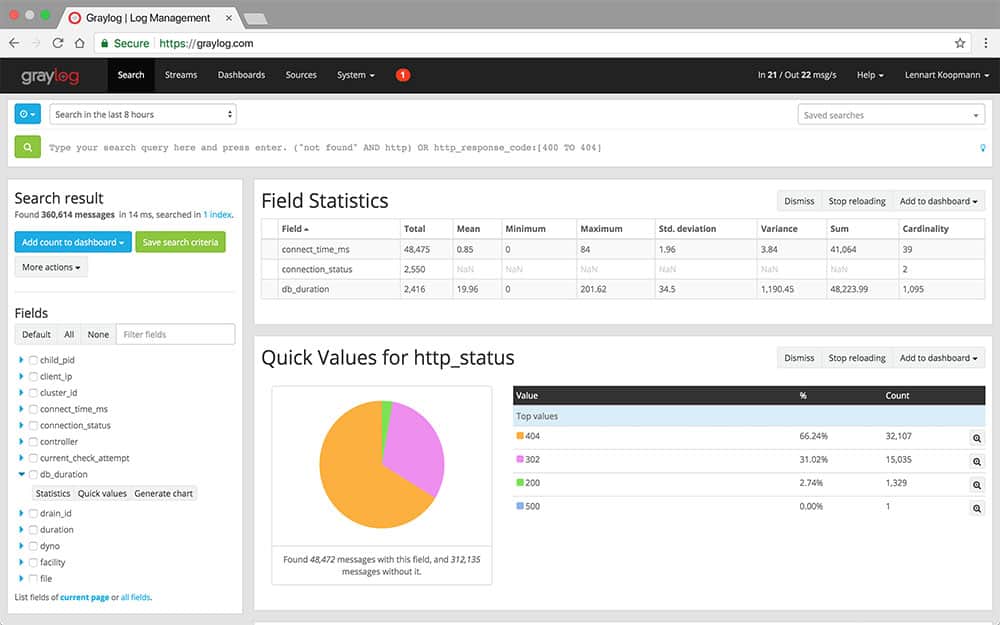
Graylog is a seamless log data tool that captures, collects, analyzes, and visualizes log data to give the insights you need about your applications' health and performance.
Key Features:
- Provides the insights you need to identify and stop threats from creating a huge security impact.
- Eases the auditing process and ensures compliance.
- Reduces downtime and streamlines the overall IT process.
- Eliminates complexities and supports smooth DevOps planning and execution.
- Generates reports and dashboards to empower non-tech users as well.
- Build queries in minutes and execute them in seconds to give all the data you need right away.
- Chains requests for a detailed root-cause analysis.
- Supports custom analysis and reporting.
- Enables you to build complex alerts and stay on top of events as they occur.
- Works well across a wide range of operating systems.
- Handles data from many devices such as IoT devices, custom apps, firewalls, routers, DBMS, and more.
- Retains your log data for a long time to enable historical analysis.
- Makes it easy to import and export data.
Why do we recommend Graylog?
Graylog is recommended for its capability to capture, collect, analyze, and visualize log data, offering insights into applications' health and performance. Its features like easy auditing, compliance assurance, and streamlined DevOps execution make it a comprehensive tool for IT process optimization and security threat identification.
Who is it recommended for?
Graylog is suitable for organizations of various sizes, especially those looking for a scalable log data tool capable of handling large volumes of data. Its user-friendly reporting and monitoring features make it ideal for IT professionals and network administrators seeking a reliable log management solution.
Pros:
- Was built to un-silo and ingest large amounts of data
- Uses simple widgets to create custom reports, dashboards, and monitors
- Offers Content Packs, which act as add-ons to help interpret data faster
- Additional features can be found on the user-powered community marketplace
Cons:
- The open-source version isn’t the best option for large enterprises
Pricing: Graylog offers four pricing tiers, and they are:
- Graylog Open – This is an open-source version and is free to use.
- Graylog Small Business – This is also a free plan where the log volume is limited to 5GB/day.
- Graylog Enterprise – Ideal for large enterprises with on-prem infrastructure. Contact the sales team for a quote.
- Graylog Cloud – Works well for a cloud or hybrid infrastructure. Again, contact the sales team for a quote.
Download: Click here to watch the demo.
Final Thoughts
To recap, logs are an essential part of every organization's infrastructure and can be leveraged to understand security threats, application performance, errors and bugs, and more. However, every organization generates tons of log data, making it impossible to sift through them to find the insights you want. Further, the logs can be spread across different files across multiple stacks.
The aforementioned tools address these issues profoundly as they collect log data from different sources, analyze them, and generate the visuals or reports you need to understand the state of your operations and make appropriate decisions accordingly. While we like all the tools mentioned in this article, our editors recommend SolarWinds tools as they come with advanced features and extended capabilities for streamlined log management.
Log Parsing Tools FAQs
Why is log parsing important?
Log parsing is important because it provides visibility into system activity, helps identify potential issues, and facilitates troubleshooting and system management.
What are some common log parsing tools?
Common log parsing tools include tools such as Splunk, ELK Stack, and Graylog.
What types of logs can be parsed using log parsing tools?
Using log parsing tools, administrators can parse logs such as system logs, web server logs, application logs, and security logs.
How does log parsing work?
Log parsing works by analyzing log files using specific parsing rules and techniques to extract relevant data and information.
What types of information can be gathered from log parsing?
Using log parsing, administrators can gather information such as timestamps, error messages, user activity, system performance metrics, and security events.
What are some best practices for log parsing?
Best practices for log parsing include defining clear parsing objectives, selecting the right tool for your needs, regularly reviewing parsing data, and taking action to address any issues identified.
Can log parsing tools integrate with other system management tools?
Yes, many log parsing tools can integrate with other system management tools such as network performance monitoring, configuration management, and security information and event management (SIEM) tools.


